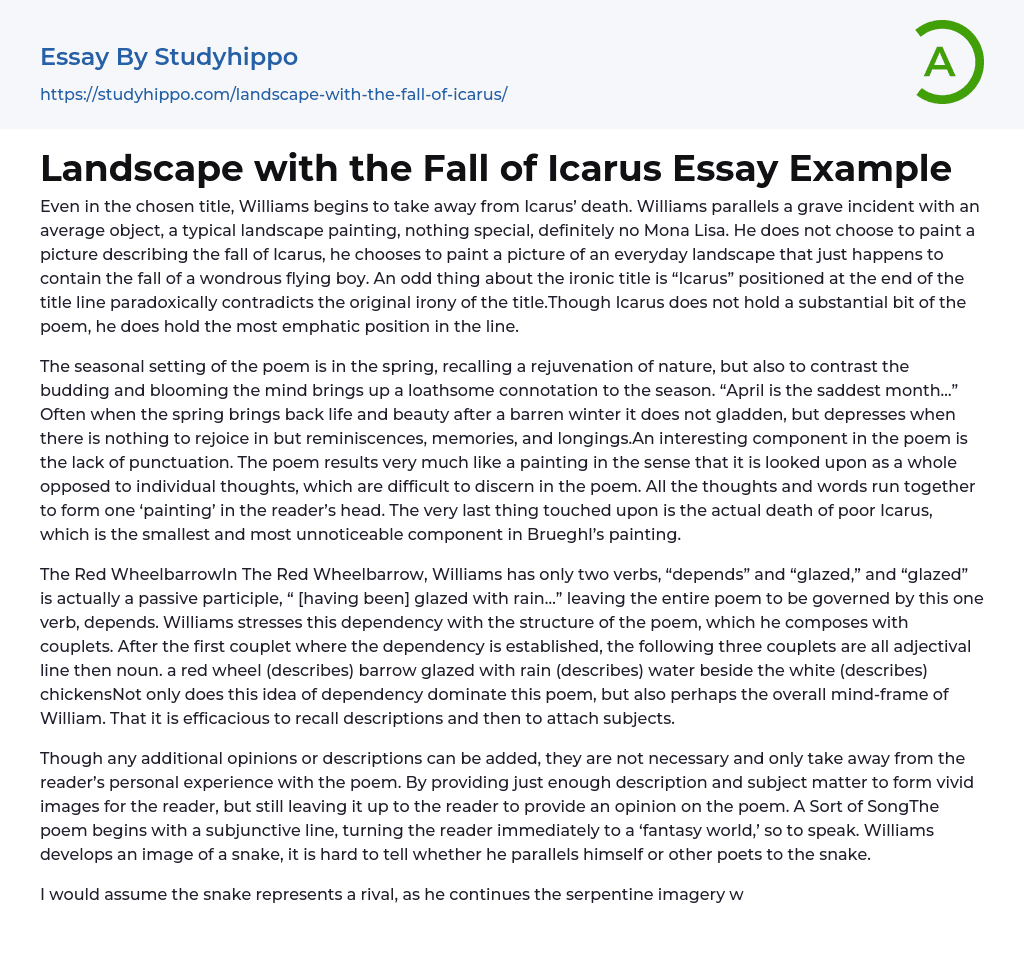Even in the chosen title, Williams begins to take away from Icarus’ death. Williams parallels a grave incident with an average object, a typical landscape painting, nothing special, definitely no Mona Lisa. He does not choose to paint a picture describing the fall of Icarus, he chooses to paint a picture of an everyday landscape that just happens to contain the fall of a wondrous flying boy. An odd thing about the ironic title is “Icarus” positioned at the end of the title line paradoxically contradicts the original irony of the title.Though Icarus does not hold a substantial bit of the poem, he does hold the most emphatic position in the line.
The seasonal setting of the poem is in the spring, recalling a rejuvenation of nature, but also to contrast the budding and blooming the mind brings up a loathso
...me connotation to the season. “April is the saddest month…” Often when the spring brings back life and beauty after a barren winter it does not gladden, but depresses when there is nothing to rejoice in but reminiscences, memories, and longings.An interesting component in the poem is the lack of punctuation. The poem results very much like a painting in the sense that it is looked upon as a whole opposed to individual thoughts, which are difficult to discern in the poem. All the thoughts and words run together to form one ‘painting’ in the reader’s head. The very last thing touched upon is the actual death of poor Icarus, which is the smallest and most unnoticeable component in Brueghl’s painting.
The Red WheelbarrowIn The Red Wheelbarrow, Williams has only two verbs, “depends” and “glazed,�
and “glazed” is actually a passive participle, “ [having been] glazed with rain…” leaving the entire poem to be governed by this one verb, depends. Williams stresses this dependency with the structure of the poem, which he composes with couplets. After the first couplet where the dependency is established, the following three couplets are all adjectival line then noun. a red wheel (describes) barrow glazed with rain (describes) water beside the white (describes) chickensNot only does this idea of dependency dominate this poem, but also perhaps the overall mind-frame of William. That it is efficacious to recall descriptions and then to attach subjects.
Though any additional opinions or descriptions can be added, they are not necessary and only take away from the reader’s personal experience with the poem. By providing just enough description and subject matter to form vivid images for the reader, but still leaving it up to the reader to provide an opinion on the poem. A Sort of SongThe poem begins with a subjunctive line, turning the reader immediately to a ‘fantasy world,’ so to speak. Williams develops an image of a snake, it is hard to tell whether he parallels himself or other poets to the snake.
I would assume the snake represents a rival, as he continues the serpentine imagery with his diction, “slow…sharp…strike…sleepless…” He goes on to say that this snake uses metaphor to bring together people and the stones. The snake slyly compares people with stones, employing the usage of metaphor. The core of the poem lies in the following lines with “(No ideas but in things) Invent! The abstract, intangible idea is not what catches the eye
of the mind, but things with substance. My personally favorite section of the poem are the last two lines. “Saxifrage is my flower that splits the rocks. ” He recalls the usage of stone imagery in the poem as he says “rocks,” having compared people with stones only a bit further up the poem.
The cleverness of these two lines resides in the subject of the line, “saxifrage. ” Saxifrage literally means “rock breaking” when looking at its etymology, “saxum,” a noun for rock and “frango, frangere” a verb for break.This carries through Williams philosophy that fanciful metaphors do not need to be used to parallel people and stones, simple use a literal description or observation of the similarities. For it is true that one can split rocks with a rock splitting flower. I do have scholars to compare my analyses of Landscape and Wheelbarrow, but I haven’t been able to find an analysis of Song.
http://www. english. uiuc. edu/maps/poets/s_z/williams/williams. htm http://www.
poets. org/poets/poets. cfm? 45442B7C000C070709 William Carlos Williams, Brinnin William Carlos Williams, Miller William Carlos Williams, The Art of, Guimond
- Boo Radley essays
- Genesis essays
- Richard iii essays
- Alice in Wonderland essays
- On the road essays
- Ozymandias essays
- The Nightingale essays
- Holden Caulfield essays
- Animal Farm essays
- 1984 essays
- A Hanging essays
- Shooting An Elephant essays
- A Tale Of Two Cities essays
- Adventures Of Huckleberry Finn essays
- Arthur Conan Doyle essays
- Brave New World essays
- Characters In Hamlet essays
- Characters In Romeo And Juliet essays
- Desdemona essays
- Diary Of A Wimpy Kid essays
- First-Person Narrative essays
- Frankenstein essays
- Heart Of Darkness essays
- Jane Eyre essays
- Jay Gatsby essays
- King Duncan essays
- Librarian essays
- Little Red Riding Hood essays
- Lord Of The Flies essays
- Silas Marner essays
- The Cask Of Amontillado essays
- The Catcher In The Rye essays
- The Crucible essays
- The Handmaid's Tale essays
- The Reader essays
- Virgil essays
- Wuthering Heights essays
- Candide essays
- Castle essays
- J. D. Salinger essays
- Ulysses essays
- Ethan Frome essays
- In Cold Blood essays
- Outliers essays
- Tuesdays With Morrie essays
- The Art of War essays
- Wife of Bath essays
- Huckleberry Finn essays
- The Lady With The Dog essays
- Great Expectations essays




